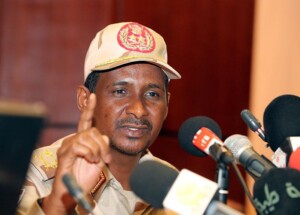Resistance committees in Sudan capital agree on ‘tight cooperation’
Coordination teams of resistance committees in greater Khartoum have agreed on the necessity of tight cooperation between them and other democratic forces, in order to reverse the October 2021 military coup and start building a democratic Sudan. The initiative received a wide welcome among political and professional groups. Other resistance committees criticised the step.
 Marches of the Millions in Khartoum, October 30, 2021 - 'The People are Stronger - No Way Back' (Social media)
Marches of the Millions in Khartoum, October 30, 2021 - 'The People are Stronger - No Way Back' (Social media)
Coordination teams of resistance committees in greater Khartoum have agreed on the necessity of tight cooperation between them and other democratic forces, in order to reverse the October 2021 military coup and start building a democratic Sudan. The initiative received a wide welcome among political and professional groups. Other resistance committees criticised the step.
Nine coordination teams from the cities of Khartoum, Omdurman, and Khartoum North, explained in a joint statement on tuesday that “the step comes in response to calls for a broad national front, in order to develop the peaceful struggle quantitatively and qualitatively by establishing a coordinating framework”.
They deplored “the fragmentation among the anti-coup forces by which the putschists could continue their destructive politics”.
The resistance committees also agreed on an urgent workshop “to find a working formula for joint coordination, and to set up transparent and clear dialogue between the resistance committees and all political, professional, and revolutionary forces to reverse the military coup”. They confirmed their stance of “No partnership with the military, nor legitimacy for them, nor negotiations with them”.
The coordinating teams of the resistance committees in southern Khartoum and those of El Jereif East Khartoum however, denounced the initiative. They stated that the move nullified the Charter for the Establishment of the People’s Authority (CEPA), issued by the Khartoum Resistance Committees in February.
The adoption of a new political alliance with political and professional forces, would bypass the provisions of the CEPA, they said, and affirmed their adherence to the charter “as a political and revolutionary roadmap to bring down the putschists after uniting with the resistance committees in all parts of Sudan”.
Welcomed
The step was widely welcomed by 22 professional associations, including the Central Committee of Sudanese Doctors, the Sudanese Teachers Committee, and the Sudanese Bar Association. In a joint statement yesterday, they called on the resistance committees, and professionals and workers in the rest of Sudan, “to respond in order to bring down the coup, return to the democratic path, and not give in to any obstacles and difficulties that prevent consensus”.
Resistance committees in River Nile state and White Nile state also welcomed the initiative to combine forces against the military junta. The Atbara Resistance Committees stated that “unity of the power of the revolution is the main entrance to overthrow the coup” and lauded the Khartoum Resistance Committees for their “realistic and political considerations”.
Omar El Degeir, head of the Sudanese Congress Party, which is a member of the Forces for Freedom and Change-Central Council (FFC-CC) called the initiative “a step in the right direction”.
He accused the military junta of “evading and mobilising its supporters under the banner of various initiatives” in a statement yesterday. The initiative to form a broad national front “is the only way to achieve victory over the putschists,” he said.
In an interview with Radio Dabanga on Tuesday, Volker Perthes, the UN Special Representative for Sudan and head of the UN Integrated Transition Assistance Mission in Sudan (UNITAMS), urged all Sudanese forces to cooperate in order to avert an economic and security collapse.











 and then
and then